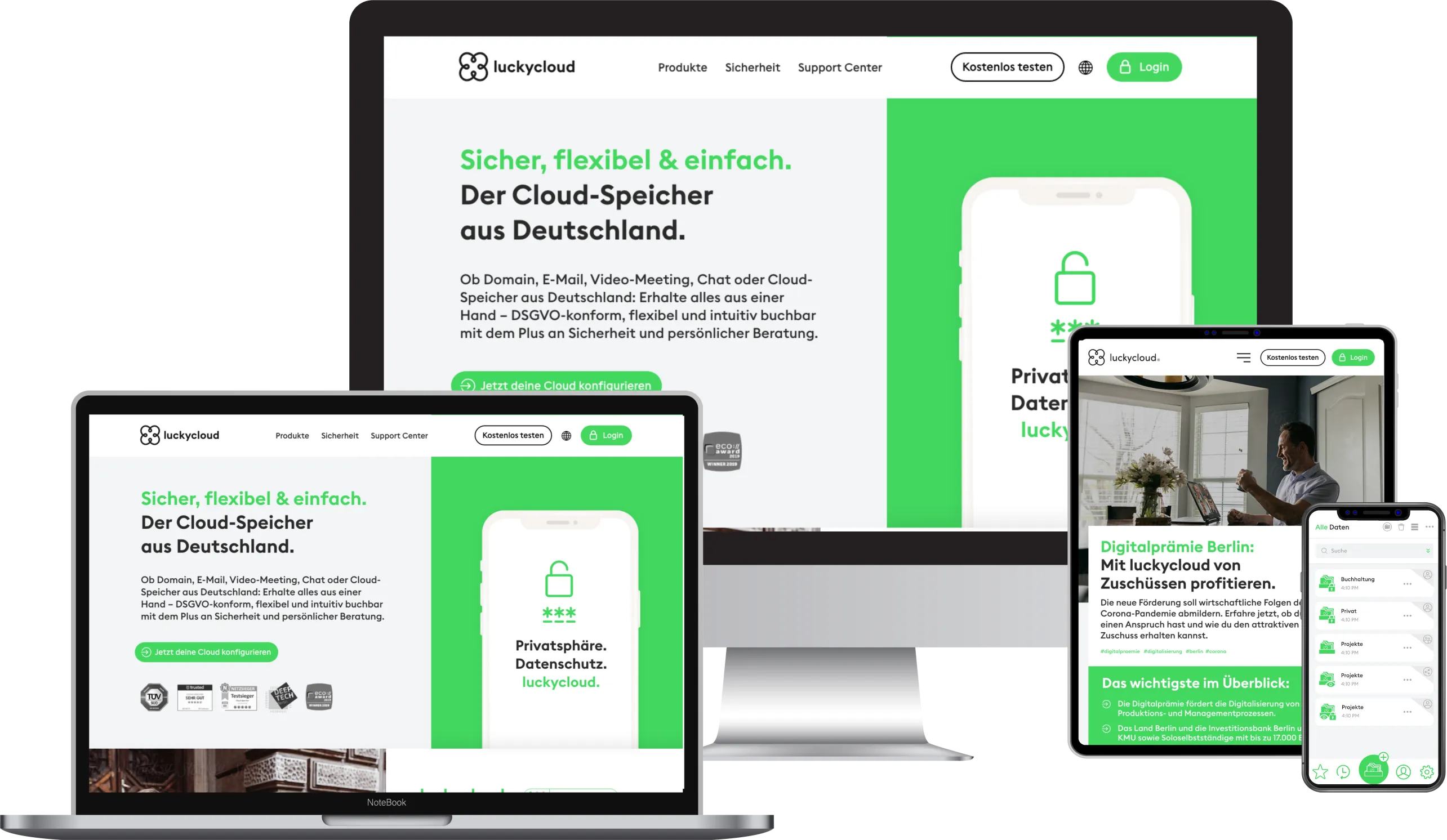Remote nowBooking an appointment
Summary





All-rounder Hybrid Cloud - clever combination of backup and data processing
Why hybrid cloud solutions are the future
Today a large number of companies, but also increasingly self-employed and private households use cloud storage to store their data. The biggest advantages are obvious: The often large amounts of data no longer burden the local storage or the cloud represents a backup for those data that are nevertheless stored locally.
But a smart cloud storage can do much more today: Modern cloud systems offer users the possibility to share their data with others in a targeted manner or to work together online. Selective synchronization and sharing of folders also make work easier and give the owners of the data a maximum of control - at least if you choose the right cloud systems.
Nevertheless, there are companies that prefer a local system that is shielded on the company's own servers for fear of espionage and data theft. Basically, there is nothing wrong with playing it safe. But this article deals with the problems that can result from this isolation and what a hybrid cloud solution can do about it.
Private Cloud or Public Cloud? – Or both?
The advantages of internal company networks are manifold. To enumerate them would go beyond the scope of this article and would also mean bringing owls to Athens. The intranet, or private cloud, is basically used for communication and the exchange of data within the employees of a company. Through the theoretically possible reach of the intranet, employees should be able to access information and files both in the office and at home.
However, this range is often opposed by actual use. As soon as confidential contents and sensitive data land on the private devices of employees, even the best VPN network can no longer protect these data optimally. Not to mention the fact, that VPN access depends on a very stable and high-performance internet connection on the companys server. If something doesn't work, nobody can work anymore. This is not only annoying, but can also cause real problems, depending on the company. In the case of cloud systems, on the other hand, each employee is connected to the cloud storage via his or her own internet connection. If a system fails, even if it is the company's system, most employees don't even notice it.
With increasing company size (when the establishment of a private cloud first becomes worthwhile), however, the demands on the infrastructure of the internal IT systems also grow. More users, more storage, more areas that have to be shielded and accesses that have to be managed. A demand-oriented structure must also be scalable; after all, a company must be able to grow. Such structures are associated with high costs and require constant adaptation. At this point it is worthwhile to think about an external Cloud Hosting.
But when it comes to data backup, there is almost no way around a cloud solution. If all data is stored on the company's servers, it can all be destroyed at once, for example in case of fire or as a result of criminal activities. A cloud backup provides security - at least under the right conditions!

The Hybrid Cloud - more than "just" a cloud storage
Let's start with the basics. A classic cloud storage is like an external warehouse where you have rented a certain amount of space. You "carry" your data there, leave it there and retrieve it when needed. To edit the data you usually have to "drag" it out of the cloud and then upload it again. This is usually done automatically thanks to synchronization.
The problem here: any technical system can be affected by failures or maintenance. During this time the data in the cloud is not accessible. If you use the cloud storage as a pure backup, a failure only affects current changes. However, if you outsource your data completely, e.g. to save internal capacities, you have no chance to access your data in this case. The "data sovereignty" no longer lies with you, as you are not fully in control of your data.
The Hybrid Cloud avoids this shortcoming by linking two different cloud systems. This is usually a combination of private cloud and public cloud: In the company, an internal server - e.g. a NAS server - provides the second system. Or rather the first, because the NAS server is where the company's internal data management is located, i.e. the private cloud. The company's employees in the office are all connected to the NAS server, not to the public cloud. This means that all files are always available in the company and can be accessed by the users even if, for example, the internet connection is lost. The data sovereignty remains in any case with the owner of the data, i.e. the company.
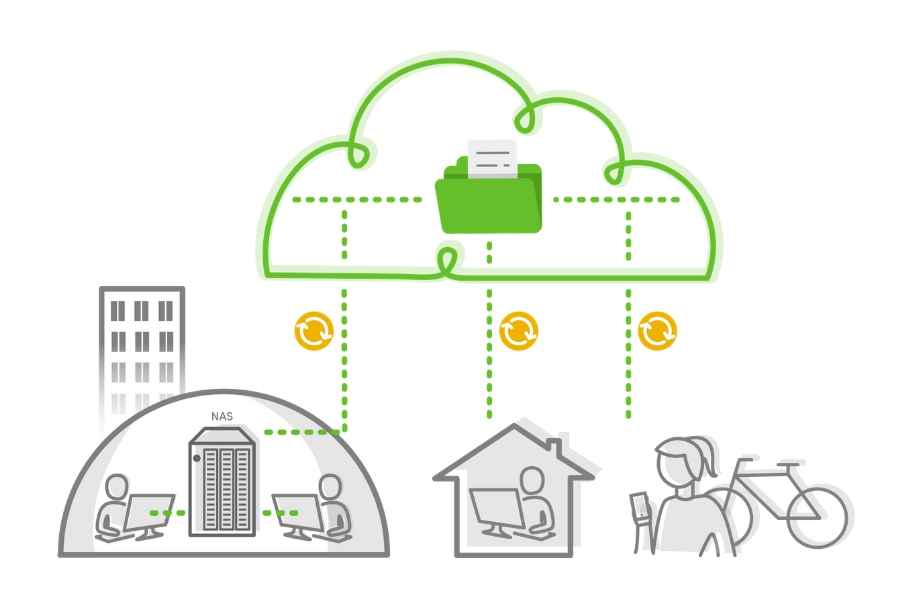
In order to secure all data in the long term and to make it available to employees in the home office or field service, the private cloud or the NAS server permanently synchronizes with the public cloud. So if you want to access internal data from home, you don't have to use a VPN access to connect directly to the private cloud or the NAS server (which can quickly lead to a VPN connection being overloaded when there is a high user frequency and corresponding data volumes), but instead access the data in the public cloud directly.
NAS server: smart cloud server and simple operation
The question is legitimate: What makes a NAS server special as a private cloud?
Granted, coupling a local server with a cloud is not a fundamentally new idea. However, it has rarely been implemented because most servers are not designed to permanently transfer data to and from a cloud. For example, standard servers use so-called WebDAV protocols, which laboriously upload complete documents and data records to the Internet. This is neither fast nor efficient and therefore hardly suitable for use in companies.
A NAS server, on the other hand, is smaller and significantly more powerful than old-fashioned servers, which is particularly important when companies operate their own data center. In addition, they are simply and easily integrated as a network drive and can be managed via the browser of a PC, independent of the operating systems used.
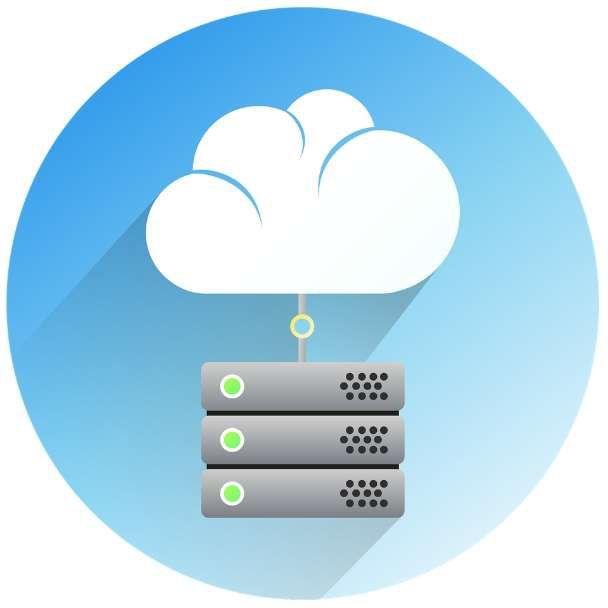
But much more interesting is the design of the NAS devices: Thanks to the modern HybridMount caching solution in combination with the intelligent synchronization of the luckycloud software, the connection between NAS and cloud is more efficient than ever. Sounds complicated? It‘s not at all.
How exactly this works and which combination of cloud solution and NAS are the best, you will learn in the continuation:
Part 2: QNAP NAS server and luckycloud - perfect match for Hybrid Clouds
--
Author: Julia Munsch
You might also be interested in

Secure Exchange Alternative: Open-Source Groupware from Germany for Data-Sovereign Teams
More and more companies are reassessing whether their current communication systems still meet their needs. Proprietary platforms like Microsoft Exchange tie users to complex licensing models, rigi...
Updated: 15.10.2025
Learn more
Cloud Storage for Teams: Collaborate Securely, Flexibly, and GDPR-Compliant
A cloud storage solution for teams is indispensable today. Teamwork has long since gone digital: hybrid models and distributed locations are part of everyday life, files need to be available at all...
Updated: 01.10.2025
Learn more
Secure Dropbox Alternatives: Cloud Storage Compared
Dropbox is one of the most well-known cloud storage services worldwide, used by millions of people every day. But a closer look reveals a fundamental privacy issue behind its convenient interface....
Updated: 08.08.2025
Learn more
Cloud Infrastructure for Startups: How to Launch Securely and Scale Confidently
You've taken the first step: the company is founded, the team is motivated. Now you need a digital infrastructure that can keep up with your ideas. What’s often underestimated in practice: choosing...
Updated: 21.05.2025
Learn more
Host Europe migrates email to Microsoft – and SMEs lose data sovereignty
Host Europe has made its move: The provider has announced that all email mailboxes will be migrated to Microsoft 365 starting in May 2025. Anyone who previously trusted their data to servers in Ger...
Updated: 01.04.2025
Learn more
Secure Data Exchange with Clients Made Easy: One-Time Codes and Name Entry with luckycloud
Sharing data with others should be as simple and secure as possible. Companies need to exchange sensitive information with clients, partners, or internal teams—but once a link is shared, it can qui...
Updated: 26.03.2025
Learn more
Less Frustration, More Flow: A Comparison of the Most Popular Tools for Digital Collaboration
Digital communication and collaboration are essential in companies – but often feel more like chaos than productivity. We compare the most common tools and highlight their advantages and disadvanta...
Updated: 21.03.2025
Learn more
luckychat is here! The new open-source messenger from luckycloud for optimal team communication
From now on, luckychat is available as a secure open-source alternative to platforms like Microsoft Teams and Slack for your business! The latest addition to the luckycloud product family guarantee...
Updated: 29.01.2025
Learn more
Cloud and Collaboration Trends 2025: Security and Teamwork in Focus
The IT world is evolving faster than ever – staying ahead means being prepared. 2025 brings groundbreaking advancements in cloud security, hybrid cloud, and digital collaboration tools. Discover th...
Updated: 11.03.2025
Learn more
Secure Alternative to Webex, Zoom, and Co.: luckycloud Launches Solution for Online Meetings
Secure online meetings are a must-have, and video conferencing tools are indispensable in everyday work life. However, providers like Zoom or Webex are heavily criticized due to data privacy issues.
Updated: 11.03.2025
Learn more
Artificial intelligence in the enterprise: How humans and technology become a service dream team
Whether a customer remains loyal to a company or switches to a competitor is increasingly determined by contact with customer service. Today, consumers and business customers alike expect fast and...
Updated: 27.10.2023
Learn more
Protected data rooms: Cloud service for works councils ensures IT independence
Securely storing and processing their own data in the cloud is now part of everyday work for more and more companies. In recent years, they have increasingly introduced new systems, expanded intern...
Updated: 27.10.2023
Learn more
Digitalprämie Berlin - how to benefit from the subsidies with luckycloud
With the digital bonus, the state of Berlin and Investitionsbank Berlin (IBB) want to promote the digitalization of the working world. The acquisition of IT hardware and software for digital transf...
Updated: 07.06.2023
Learn more
Service for cloud solutions: Focus on the customer's needs
Good service pays off - this is also or especially true in difficult times, when the economy is facing numerous challenges due to the Corona pandemic. Only those who convince their customers with a...
Updated: 07.06.2023
Learn more
QNAP NAS and luckycloud - perfect match for Hybrid Clouds
Hybrid Cloud solutions do not have to be complicated. As with all successful combinations, it all depends on the right components! luckycloud - as a secure cloud provider from Germany with the high...
Updated: 07.06.2023
Learn more
All-rounder Hybrid Cloud - clever combination of backup and data processing
IT systems can be affected by failures or maintenance. During this time data in the cloud is not accessible. If you use the cloud storage as pure backup, a failure only affects current changes. But...
Updated: 22.06.2023
Learn more
Crash course GDPR - Summary of the 10 most important facts
25 May 2018 - the GDPR came into force on this date. Curse or blessing? After 2 years this is not exactly one of the most popular topics for companies. Nevertheless, the DSGVO has an important sign...
Updated: 07.06.2023
Learn more
Cloud storage in the home office - Set up luckycloud in your home office in 3 steps
There is hardly anyone left who is not affected by the current crisis, let alone severely restricted. Suddenly there are people in the home office who have never (had to) think about how to work ou...
Updated: 22.06.2023
Learn more
Home Office Preparation - Working from home without loss of control
Many managers are currently in conflict over the decision whether to use home office or not. The biggest barrier here is not the technical hurdle, but the feeling of loss of control. Many bosses ar...
Updated: 07.06.2023
Learn more
Home Office Checklist - Corona crisis becomes surveillance scandal 2.0
The corona crisis has stirred up many minds. Many entrepreneurs are interested in a quick solution and forget the daily dangers of digital data processing. People's privacy is sometimes trampled un...
Updated: 07.06.2023
Learn more
Home Office Guide in times of the coronavirus - working fast and safe from home
Current news about the corona virus is piling up. Many send their employees to the home office - but for many industries this is simply impossible. On various platforms there are lists of digital t...
Updated: 07.06.2023
Learn more
A cloud provider from Germany with easy user and data administration was especially important to us!
The demands for schools to be equipped with technical devices, a modern IT infrastructure and secure software solutions are anything but new. This applies to the administration as well as the teach...
Updated: 22.06.2023
Learn more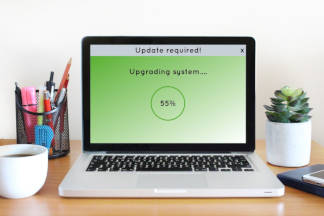
Why are updates important?
"Again?!", this is the thought you always have when you see a pop up with an update on your computer again. One is simply annoyed and clicks on "Remember later". But this is exactly what you should...
Updated: 07.06.2023
Learn more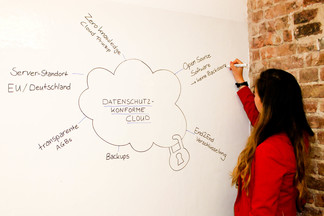
Anniversary of the basic data protection regulation - Part 3 outlook and summary
Indeed, further regulations will follow in the future. With the DSGVO, the basic framework for far-reaching data protection regulation has been established, although the next stage of the DSGVO is...
Updated: 07.06.2023
Learn more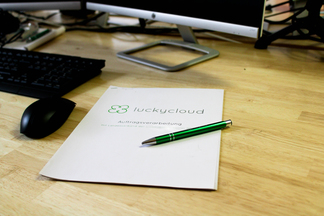
Anniversary of the Basic Data Protection Regulation - Part 2 Travelling in the Cloud as a Business Customer
With the introduction of the DSGVO, the protection of personal data has rightly moved back to the foreground. In this part of the three-part interview with Fresh Compliance, we have clarified for y...
Updated: 07.06.2023
Learn more
Anniversary of the Basic Data Protection Regulation - Part 1 What is the DSGVO?
One year has now passed since the DSGVO came into force and its introduction caused a lot of unrest and has been hotly debated in recent years, as has the topic of data protection in public clouds....
Updated: 07.06.2023
Learn more
Introduction to luckycloud - Part 2 Collaborative Teamwork with the Team Manager
One has just got used to the old system and then the boss comes around the corner and is of the opinion to integrate a new system because the old one is no longer DSGVO-compliant. The switch to a n...
Updated: 07.06.2023
Learn more
Secure Exchange Alternative: Open-Source Groupware from Germany for Data-Sovereign Teams
More and more companies are reassessing whether their current communication systems still meet their needs. Proprietary platforms like Microsoft Exchange tie users to complex licensing models, rigi...
Updated: 15.10.2025
Learn more
Cloud Storage for Teams: Collaborate Securely, Flexibly, and GDPR-Compliant
A cloud storage solution for teams is indispensable today. Teamwork has long since gone digital: hybrid models and distributed locations are part of everyday life, files need to be available at all...
Updated: 01.10.2025
Learn more
Secure Dropbox Alternatives: Cloud Storage Compared
Dropbox is one of the most well-known cloud storage services worldwide, used by millions of people every day. But a closer look reveals a fundamental privacy issue behind its convenient interface....
Updated: 08.08.2025
Learn more
Cloud Infrastructure for Startups: How to Launch Securely and Scale Confidently
You've taken the first step: the company is founded, the team is motivated. Now you need a digital infrastructure that can keep up with your ideas. What’s often underestimated in practice: choosing...
Updated: 21.05.2025
Learn more
Host Europe migrates email to Microsoft – and SMEs lose data sovereignty
Host Europe has made its move: The provider has announced that all email mailboxes will be migrated to Microsoft 365 starting in May 2025. Anyone who previously trusted their data to servers in Ger...
Updated: 01.04.2025
Learn more
Secure Data Exchange with Clients Made Easy: One-Time Codes and Name Entry with luckycloud
Sharing data with others should be as simple and secure as possible. Companies need to exchange sensitive information with clients, partners, or internal teams—but once a link is shared, it can qui...
Updated: 26.03.2025
Learn more
Less Frustration, More Flow: A Comparison of the Most Popular Tools for Digital Collaboration
Digital communication and collaboration are essential in companies – but often feel more like chaos than productivity. We compare the most common tools and highlight their advantages and disadvanta...
Updated: 21.03.2025
Learn more
luckychat is here! The new open-source messenger from luckycloud for optimal team communication
From now on, luckychat is available as a secure open-source alternative to platforms like Microsoft Teams and Slack for your business! The latest addition to the luckycloud product family guarantee...
Updated: 29.01.2025
Learn more
Cloud and Collaboration Trends 2025: Security and Teamwork in Focus
The IT world is evolving faster than ever – staying ahead means being prepared. 2025 brings groundbreaking advancements in cloud security, hybrid cloud, and digital collaboration tools. Discover th...
Updated: 11.03.2025
Learn more
Secure Alternative to Webex, Zoom, and Co.: luckycloud Launches Solution for Online Meetings
Secure online meetings are a must-have, and video conferencing tools are indispensable in everyday work life. However, providers like Zoom or Webex are heavily criticized due to data privacy issues.
Updated: 11.03.2025
Learn more
Artificial intelligence in the enterprise: How humans and technology become a service dream team
Whether a customer remains loyal to a company or switches to a competitor is increasingly determined by contact with customer service. Today, consumers and business customers alike expect fast and...
Updated: 27.10.2023
Learn more
Protected data rooms: Cloud service for works councils ensures IT independence
Securely storing and processing their own data in the cloud is now part of everyday work for more and more companies. In recent years, they have increasingly introduced new systems, expanded intern...
Updated: 27.10.2023
Learn more
Digitalprämie Berlin - how to benefit from the subsidies with luckycloud
With the digital bonus, the state of Berlin and Investitionsbank Berlin (IBB) want to promote the digitalization of the working world. The acquisition of IT hardware and software for digital transf...
Updated: 07.06.2023
Learn more
Service for cloud solutions: Focus on the customer's needs
Good service pays off - this is also or especially true in difficult times, when the economy is facing numerous challenges due to the Corona pandemic. Only those who convince their customers with a...
Updated: 07.06.2023
Learn more
QNAP NAS and luckycloud - perfect match for Hybrid Clouds
Hybrid Cloud solutions do not have to be complicated. As with all successful combinations, it all depends on the right components! luckycloud - as a secure cloud provider from Germany with the high...
Updated: 07.06.2023
Learn more
All-rounder Hybrid Cloud - clever combination of backup and data processing
IT systems can be affected by failures or maintenance. During this time data in the cloud is not accessible. If you use the cloud storage as pure backup, a failure only affects current changes. But...
Updated: 22.06.2023
Learn more
Crash course GDPR - Summary of the 10 most important facts
25 May 2018 - the GDPR came into force on this date. Curse or blessing? After 2 years this is not exactly one of the most popular topics for companies. Nevertheless, the DSGVO has an important sign...
Updated: 07.06.2023
Learn more
Cloud storage in the home office - Set up luckycloud in your home office in 3 steps
There is hardly anyone left who is not affected by the current crisis, let alone severely restricted. Suddenly there are people in the home office who have never (had to) think about how to work ou...
Updated: 22.06.2023
Learn more
Home Office Preparation - Working from home without loss of control
Many managers are currently in conflict over the decision whether to use home office or not. The biggest barrier here is not the technical hurdle, but the feeling of loss of control. Many bosses ar...
Updated: 07.06.2023
Learn more
Home Office Checklist - Corona crisis becomes surveillance scandal 2.0
The corona crisis has stirred up many minds. Many entrepreneurs are interested in a quick solution and forget the daily dangers of digital data processing. People's privacy is sometimes trampled un...
Updated: 07.06.2023
Learn more
Home Office Guide in times of the coronavirus - working fast and safe from home
Current news about the corona virus is piling up. Many send their employees to the home office - but for many industries this is simply impossible. On various platforms there are lists of digital t...
Updated: 07.06.2023
Learn more
A cloud provider from Germany with easy user and data administration was especially important to us!
The demands for schools to be equipped with technical devices, a modern IT infrastructure and secure software solutions are anything but new. This applies to the administration as well as the teach...
Updated: 22.06.2023
Learn more
Why are updates important?
"Again?!", this is the thought you always have when you see a pop up with an update on your computer again. One is simply annoyed and clicks on "Remember later". But this is exactly what you should...
Updated: 07.06.2023
Learn more
Anniversary of the basic data protection regulation - Part 3 outlook and summary
Indeed, further regulations will follow in the future. With the DSGVO, the basic framework for far-reaching data protection regulation has been established, although the next stage of the DSGVO is...
Updated: 07.06.2023
Learn more
Anniversary of the Basic Data Protection Regulation - Part 2 Travelling in the Cloud as a Business Customer
With the introduction of the DSGVO, the protection of personal data has rightly moved back to the foreground. In this part of the three-part interview with Fresh Compliance, we have clarified for y...
Updated: 07.06.2023
Learn more
Anniversary of the Basic Data Protection Regulation - Part 1 What is the DSGVO?
One year has now passed since the DSGVO came into force and its introduction caused a lot of unrest and has been hotly debated in recent years, as has the topic of data protection in public clouds....
Updated: 07.06.2023
Learn more
Introduction to luckycloud - Part 2 Collaborative Teamwork with the Team Manager
One has just got used to the old system and then the boss comes around the corner and is of the opinion to integrate a new system because the old one is no longer DSGVO-compliant. The switch to a n...
Updated: 07.06.2023
Learn more
Secure Exchange Alternative: Open-Source Groupware from Germany for Data-Sovereign Teams
More and more companies are reassessing whether their current communication systems still meet their needs. Proprietary platforms like Microsoft Exchange tie users to complex licensing models, rigi...
Updated: 15.10.2025
Learn more
Cloud Storage for Teams: Collaborate Securely, Flexibly, and GDPR-Compliant
A cloud storage solution for teams is indispensable today. Teamwork has long since gone digital: hybrid models and distributed locations are part of everyday life, files need to be available at all...
Updated: 01.10.2025
Learn more
Secure Dropbox Alternatives: Cloud Storage Compared
Dropbox is one of the most well-known cloud storage services worldwide, used by millions of people every day. But a closer look reveals a fundamental privacy issue behind its convenient interface....
Updated: 08.08.2025
Learn more
Cloud Infrastructure for Startups: How to Launch Securely and Scale Confidently
You've taken the first step: the company is founded, the team is motivated. Now you need a digital infrastructure that can keep up with your ideas. What’s often underestimated in practice: choosing...
Updated: 21.05.2025
Learn more
Host Europe migrates email to Microsoft – and SMEs lose data sovereignty
Host Europe has made its move: The provider has announced that all email mailboxes will be migrated to Microsoft 365 starting in May 2025. Anyone who previously trusted their data to servers in Ger...
Updated: 01.04.2025
Learn more
Secure Data Exchange with Clients Made Easy: One-Time Codes and Name Entry with luckycloud
Sharing data with others should be as simple and secure as possible. Companies need to exchange sensitive information with clients, partners, or internal teams—but once a link is shared, it can qui...
Updated: 26.03.2025
Learn more
Less Frustration, More Flow: A Comparison of the Most Popular Tools for Digital Collaboration
Digital communication and collaboration are essential in companies – but often feel more like chaos than productivity. We compare the most common tools and highlight their advantages and disadvanta...
Updated: 21.03.2025
Learn more
luckychat is here! The new open-source messenger from luckycloud for optimal team communication
From now on, luckychat is available as a secure open-source alternative to platforms like Microsoft Teams and Slack for your business! The latest addition to the luckycloud product family guarantee...
Updated: 29.01.2025
Learn more
Cloud and Collaboration Trends 2025: Security and Teamwork in Focus
The IT world is evolving faster than ever – staying ahead means being prepared. 2025 brings groundbreaking advancements in cloud security, hybrid cloud, and digital collaboration tools. Discover th...
Updated: 11.03.2025
Learn more
Secure Alternative to Webex, Zoom, and Co.: luckycloud Launches Solution for Online Meetings
Secure online meetings are a must-have, and video conferencing tools are indispensable in everyday work life. However, providers like Zoom or Webex are heavily criticized due to data privacy issues.
Updated: 11.03.2025
Learn more
Artificial intelligence in the enterprise: How humans and technology become a service dream team
Whether a customer remains loyal to a company or switches to a competitor is increasingly determined by contact with customer service. Today, consumers and business customers alike expect fast and...
Updated: 27.10.2023
Learn more
Protected data rooms: Cloud service for works councils ensures IT independence
Securely storing and processing their own data in the cloud is now part of everyday work for more and more companies. In recent years, they have increasingly introduced new systems, expanded intern...
Updated: 27.10.2023
Learn more
Digitalprämie Berlin - how to benefit from the subsidies with luckycloud
With the digital bonus, the state of Berlin and Investitionsbank Berlin (IBB) want to promote the digitalization of the working world. The acquisition of IT hardware and software for digital transf...
Updated: 07.06.2023
Learn more
Service for cloud solutions: Focus on the customer's needs
Good service pays off - this is also or especially true in difficult times, when the economy is facing numerous challenges due to the Corona pandemic. Only those who convince their customers with a...
Updated: 07.06.2023
Learn more
QNAP NAS and luckycloud - perfect match for Hybrid Clouds
Hybrid Cloud solutions do not have to be complicated. As with all successful combinations, it all depends on the right components! luckycloud - as a secure cloud provider from Germany with the high...
Updated: 07.06.2023
Learn more
All-rounder Hybrid Cloud - clever combination of backup and data processing
IT systems can be affected by failures or maintenance. During this time data in the cloud is not accessible. If you use the cloud storage as pure backup, a failure only affects current changes. But...
Updated: 22.06.2023
Learn more
Crash course GDPR - Summary of the 10 most important facts
25 May 2018 - the GDPR came into force on this date. Curse or blessing? After 2 years this is not exactly one of the most popular topics for companies. Nevertheless, the DSGVO has an important sign...
Updated: 07.06.2023
Learn more
Cloud storage in the home office - Set up luckycloud in your home office in 3 steps
There is hardly anyone left who is not affected by the current crisis, let alone severely restricted. Suddenly there are people in the home office who have never (had to) think about how to work ou...
Updated: 22.06.2023
Learn more
Home Office Preparation - Working from home without loss of control
Many managers are currently in conflict over the decision whether to use home office or not. The biggest barrier here is not the technical hurdle, but the feeling of loss of control. Many bosses ar...
Updated: 07.06.2023
Learn more
Home Office Checklist - Corona crisis becomes surveillance scandal 2.0
The corona crisis has stirred up many minds. Many entrepreneurs are interested in a quick solution and forget the daily dangers of digital data processing. People's privacy is sometimes trampled un...
Updated: 07.06.2023
Learn more
Home Office Guide in times of the coronavirus - working fast and safe from home
Current news about the corona virus is piling up. Many send their employees to the home office - but for many industries this is simply impossible. On various platforms there are lists of digital t...
Updated: 07.06.2023
Learn more
A cloud provider from Germany with easy user and data administration was especially important to us!
The demands for schools to be equipped with technical devices, a modern IT infrastructure and secure software solutions are anything but new. This applies to the administration as well as the teach...
Updated: 22.06.2023
Learn more
Why are updates important?
"Again?!", this is the thought you always have when you see a pop up with an update on your computer again. One is simply annoyed and clicks on "Remember later". But this is exactly what you should...
Updated: 07.06.2023
Learn more
Anniversary of the basic data protection regulation - Part 3 outlook and summary
Indeed, further regulations will follow in the future. With the DSGVO, the basic framework for far-reaching data protection regulation has been established, although the next stage of the DSGVO is...
Updated: 07.06.2023
Learn more
Anniversary of the Basic Data Protection Regulation - Part 2 Travelling in the Cloud as a Business Customer
With the introduction of the DSGVO, the protection of personal data has rightly moved back to the foreground. In this part of the three-part interview with Fresh Compliance, we have clarified for y...
Updated: 07.06.2023
Learn more
Anniversary of the Basic Data Protection Regulation - Part 1 What is the DSGVO?
One year has now passed since the DSGVO came into force and its introduction caused a lot of unrest and has been hotly debated in recent years, as has the topic of data protection in public clouds....
Updated: 07.06.2023
Learn more
Introduction to luckycloud - Part 2 Collaborative Teamwork with the Team Manager
One has just got used to the old system and then the boss comes around the corner and is of the opinion to integrate a new system because the old one is no longer DSGVO-compliant. The switch to a n...
Updated: 07.06.2023
Learn more
Secure Exchange Alternative: Open-Source Groupware from Germany for Data-Sovereign Teams
More and more companies are reassessing whether their current communication systems still meet their needs. Proprietary platforms like Microsoft Exchange tie users to complex licensing models, rigi...
Updated: 15.10.2025
Learn more
Cloud Storage for Teams: Collaborate Securely, Flexibly, and GDPR-Compliant
A cloud storage solution for teams is indispensable today. Teamwork has long since gone digital: hybrid models and distributed locations are part of everyday life, files need to be available at all...
Updated: 01.10.2025
Learn more
Secure Dropbox Alternatives: Cloud Storage Compared
Dropbox is one of the most well-known cloud storage services worldwide, used by millions of people every day. But a closer look reveals a fundamental privacy issue behind its convenient interface....
Updated: 08.08.2025
Learn more
Cloud Infrastructure for Startups: How to Launch Securely and Scale Confidently
You've taken the first step: the company is founded, the team is motivated. Now you need a digital infrastructure that can keep up with your ideas. What’s often underestimated in practice: choosing...
Updated: 21.05.2025
Learn more
Host Europe migrates email to Microsoft – and SMEs lose data sovereignty
Host Europe has made its move: The provider has announced that all email mailboxes will be migrated to Microsoft 365 starting in May 2025. Anyone who previously trusted their data to servers in Ger...
Updated: 01.04.2025
Learn more
Secure Data Exchange with Clients Made Easy: One-Time Codes and Name Entry with luckycloud
Sharing data with others should be as simple and secure as possible. Companies need to exchange sensitive information with clients, partners, or internal teams—but once a link is shared, it can qui...
Updated: 26.03.2025
Learn more
Less Frustration, More Flow: A Comparison of the Most Popular Tools for Digital Collaboration
Digital communication and collaboration are essential in companies – but often feel more like chaos than productivity. We compare the most common tools and highlight their advantages and disadvanta...
Updated: 21.03.2025
Learn more
luckychat is here! The new open-source messenger from luckycloud for optimal team communication
From now on, luckychat is available as a secure open-source alternative to platforms like Microsoft Teams and Slack for your business! The latest addition to the luckycloud product family guarantee...
Updated: 29.01.2025
Learn more
Cloud and Collaboration Trends 2025: Security and Teamwork in Focus
The IT world is evolving faster than ever – staying ahead means being prepared. 2025 brings groundbreaking advancements in cloud security, hybrid cloud, and digital collaboration tools. Discover th...
Updated: 11.03.2025
Learn more
Secure Alternative to Webex, Zoom, and Co.: luckycloud Launches Solution for Online Meetings
Secure online meetings are a must-have, and video conferencing tools are indispensable in everyday work life. However, providers like Zoom or Webex are heavily criticized due to data privacy issues.
Updated: 11.03.2025
Learn more
Artificial intelligence in the enterprise: How humans and technology become a service dream team
Whether a customer remains loyal to a company or switches to a competitor is increasingly determined by contact with customer service. Today, consumers and business customers alike expect fast and...
Updated: 27.10.2023
Learn more
Protected data rooms: Cloud service for works councils ensures IT independence
Securely storing and processing their own data in the cloud is now part of everyday work for more and more companies. In recent years, they have increasingly introduced new systems, expanded intern...
Updated: 27.10.2023
Learn more
Digitalprämie Berlin - how to benefit from the subsidies with luckycloud
With the digital bonus, the state of Berlin and Investitionsbank Berlin (IBB) want to promote the digitalization of the working world. The acquisition of IT hardware and software for digital transf...
Updated: 07.06.2023
Learn more
Service for cloud solutions: Focus on the customer's needs
Good service pays off - this is also or especially true in difficult times, when the economy is facing numerous challenges due to the Corona pandemic. Only those who convince their customers with a...
Updated: 07.06.2023
Learn more
QNAP NAS and luckycloud - perfect match for Hybrid Clouds
Hybrid Cloud solutions do not have to be complicated. As with all successful combinations, it all depends on the right components! luckycloud - as a secure cloud provider from Germany with the high...
Updated: 07.06.2023
Learn more
All-rounder Hybrid Cloud - clever combination of backup and data processing
IT systems can be affected by failures or maintenance. During this time data in the cloud is not accessible. If you use the cloud storage as pure backup, a failure only affects current changes. But...
Updated: 22.06.2023
Learn more
Crash course GDPR - Summary of the 10 most important facts
25 May 2018 - the GDPR came into force on this date. Curse or blessing? After 2 years this is not exactly one of the most popular topics for companies. Nevertheless, the DSGVO has an important sign...
Updated: 07.06.2023
Learn more
Cloud storage in the home office - Set up luckycloud in your home office in 3 steps
There is hardly anyone left who is not affected by the current crisis, let alone severely restricted. Suddenly there are people in the home office who have never (had to) think about how to work ou...
Updated: 22.06.2023
Learn more
Home Office Preparation - Working from home without loss of control
Many managers are currently in conflict over the decision whether to use home office or not. The biggest barrier here is not the technical hurdle, but the feeling of loss of control. Many bosses ar...
Updated: 07.06.2023
Learn more
Home Office Checklist - Corona crisis becomes surveillance scandal 2.0
The corona crisis has stirred up many minds. Many entrepreneurs are interested in a quick solution and forget the daily dangers of digital data processing. People's privacy is sometimes trampled un...
Updated: 07.06.2023
Learn more
Home Office Guide in times of the coronavirus - working fast and safe from home
Current news about the corona virus is piling up. Many send their employees to the home office - but for many industries this is simply impossible. On various platforms there are lists of digital t...
Updated: 07.06.2023
Learn more
A cloud provider from Germany with easy user and data administration was especially important to us!
The demands for schools to be equipped with technical devices, a modern IT infrastructure and secure software solutions are anything but new. This applies to the administration as well as the teach...
Updated: 22.06.2023
Learn more
Why are updates important?
"Again?!", this is the thought you always have when you see a pop up with an update on your computer again. One is simply annoyed and clicks on "Remember later". But this is exactly what you should...
Updated: 07.06.2023
Learn more
Anniversary of the basic data protection regulation - Part 3 outlook and summary
Indeed, further regulations will follow in the future. With the DSGVO, the basic framework for far-reaching data protection regulation has been established, although the next stage of the DSGVO is...
Updated: 07.06.2023
Learn more
Anniversary of the Basic Data Protection Regulation - Part 2 Travelling in the Cloud as a Business Customer
With the introduction of the DSGVO, the protection of personal data has rightly moved back to the foreground. In this part of the three-part interview with Fresh Compliance, we have clarified for y...
Updated: 07.06.2023
Learn more
Anniversary of the Basic Data Protection Regulation - Part 1 What is the DSGVO?
One year has now passed since the DSGVO came into force and its introduction caused a lot of unrest and has been hotly debated in recent years, as has the topic of data protection in public clouds....
Updated: 07.06.2023
Learn more
Introduction to luckycloud - Part 2 Collaborative Teamwork with the Team Manager
One has just got used to the old system and then the boss comes around the corner and is of the opinion to integrate a new system because the old one is no longer DSGVO-compliant. The switch to a n...
Updated: 07.06.2023
Learn more



